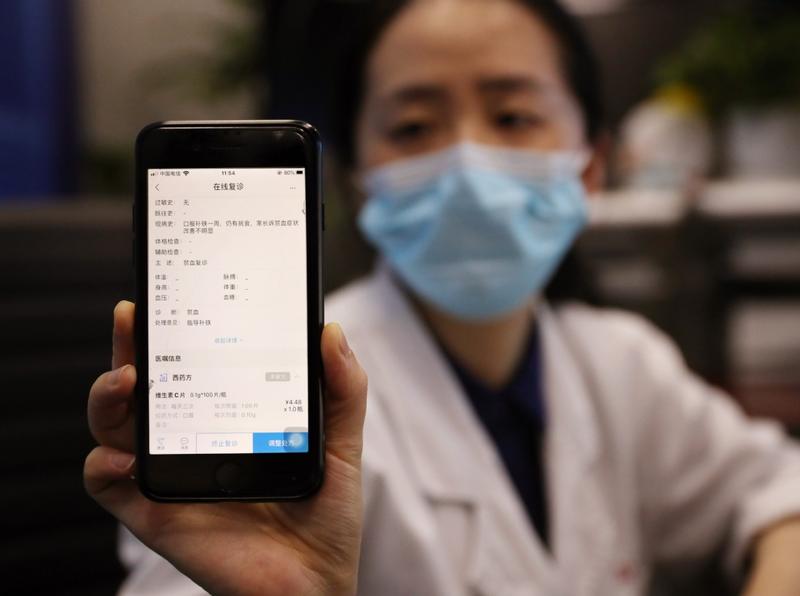 A doctor with the Children's Hospital of Fudan University displays a prescription for online patients in Shanghai on May 13, 2020. (PHOTO / XINHUA)
A doctor with the Children's Hospital of Fudan University displays a prescription for online patients in Shanghai on May 13, 2020. (PHOTO / XINHUA)
In mid-February, when the novel coronavirus was ravaging Wuhan, capital of Hubei province and the first epicenter of the COVID epidemic, Wu Hong, a 37-year-old city resident, was getting bogged down with several worries. More than the epidemic itself, her family members' dire need for drug refills was causing immense concern.
Wu's mother-in-law is a breast-cancer patient and needs regular medicine. Wu's father suffers from chronic obstructive pulmonary disease, and inhalers have been in short supply. As the epidemic grew more serious, Wu was not permitted to take her family to the hospital for drug refills. She found herself in a state of restless anxiety.
On Feb 23, the Wuhan Healthcare Security Administration issued a series of measures to ensure epidemic prevention and control and routine primary care. According to the measures, eligible internet-based medical services were included in the medical insurance system.
When online healthcare was included in the medical insurance system, patients started receiving medicines at home. Once online follow-up consultations were covered by insurance, their need for more convenient healthcare services was finally solved, further promoting the development of the online healthcare sector
Xie Fangmin, CEO of Jianke
ALSO READ: Online platforms provide medical advice, front-line diagnosis and treatment
On March 2, the National Healthcare Security Administration and the National Health Commission jointly launched a guidance on promoting the inclusion of internet-based medical services into public health insurance, giving the green light to online medical insurance.
Wu's anxiety was finally relieved. With the new policy, her family could consult with a doctor online, get a prescription for the drugs, have the drugs delivered directly home and get the medical reimbursement.
Xie Fangmin, CEO of Jianke, China's leading business-to-consumer pharmaceutical e-commerce platform, said the new policy is especially beneficial to chronic disease patients and those who need a follow-up consultation.
In the past, patients were encouraged to refill their drugs at community hospitals, and the fees were covered by medical insurance. However, problems including long waits and limited onetime medicine supply still bothered the patients, especially the elderly who have some trouble with walking, he said.
"When online healthcare was included in the medical insurance system, patients started receiving medicines at home. Once online follow-up consultations were covered by insurance, their need for more convenient healthcare services was finally solved, further promoting the development of the online healthcare sector," Xie said.
Data from app tracker Analysys Qianfan showed that in March, the monthly active users of the drug e-commerce sector surged by 7.3 percent on a monthly basis to 5.67 million. The figure for the same period last year was 3.04 million, making it an 86.5-percent year-on-year growth in March.
Currently, a batch of regions, including Tianjin, Shanghai, Zhejiang, Jiangsu, Sichuan and Guangdong, have already introduced, or are in the process of introducing, online medical reimbursements.
On Aug 30, 2019, the NHSA issued a guideline to improve policies regarding internet-based medical service fees and reimbursement of medical expenses, and many regions, such as Guangdong, Sichuan and Tianjin, have been taking steps since then.
Zhang Xiaoxu, a research fellow at VCBeat, an online healthcare website, said that for regions that have introduced online medical reimbursements, a closed loop is formed, from online consultation to drugs, further boosting the development of the sector.
In terms of the safety of drugs offered by internet-based companies, Xie from Jianke said that currently, the company's online hospital attracts nearly 200,000 doctors from the country's 3A-grade hospitals, that offer professional medication directions, to make sure patients get the right medicine and consume it in a proper way.
READ MORE: Healthtech in focus amid virus fury
In addition, to guarantee drug safety, every order submitted online will go through an artificial intelligence-enabled audit system. Pharmacists are also engaged in the checking process, offering a double safety for patients, according to Jianke.
Speaking of the future trend of the sector, Xie noted that a comprehensive operation system should be established, to optimize the allocation of medical resources, so that more patients from the rural area are able to enjoy the high-quality medical services from first-tier cities, such as Beijing and Shanghai, through the internet.
"More doctors are expected to join the online healthcare system, attracting more patients, gaining their trust and further boosting the development of the sector," he said.


